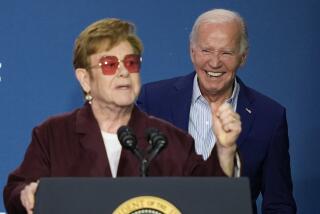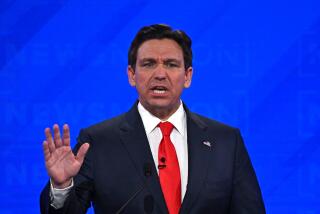Perot, on TV, Seeks to Explain His Views on Homosexuality
- Share via
DALLAS — They were “brilliant people doing outstanding work,” men and women who reported directly to him, Ross Perot recalled. And when other underlings came to him--”with their brow all furrowed”--to report that some of those go-getters were homosexuals, the Texas billionaire said, he was surprised but unfazed.
“Look, I don’t get into people’s private lives,” Perot said he told his overzealous employees. “We promote on merit, and these are people doing a wonderful job.”
Perot cited the incident on late-night national television Monday to assert his tolerance for people whose preferences and tastes differ from his.
But in trying to put to rest one controversy--sparked a few weeks ago when Perot told an interviewer that he would exclude homosexuals from some top jobs in his Administration--the likely independent presidential candidate may well have generated new questions.
Only on Sunday, Perot was quoted in the New York Times magazine as saying that he has never known a homosexual.
Citing Perot’s “confined and blinkered life,” author Lawrence Wright wrote: “He admitted to me, for instance, that, as far as he knew, he had never actually met a homosexual.”
Wright, an Austin, Tex., free-lance writer and book author, also quoted Perot as saying: “I don’t know who’s gay and who’s not. I don’t guess I can really tell you.”
Perot’s campaign press office in Dallas refused to comment on the seeming contradiction. Wright said in a telephone interview Tuesday from Austin that he was struck by Perot’s “very careful locution” in discussing the matter on ABC.
“It seemed to me that he was saying there were homosexuals working for him that he didn’t know about, that he didn’t personally know them. I don’t know how to square that.”
Perot made his televised comments about his gay and lesbian employees during a 90-minute “National Town Meeting” on ABC. The show allowed audiences in 10 cities, including New York and Los Angeles, to query Perot.
During the often lively give-and-take, Perot also elaborated on conditions under which he, as President, would seek a tax increase and lauded the economic proposals of former Massachusetts Sen. Paul E. Tsongas, a onetime contender for the Democratic presidential nomination.
Perot said he would impose a “surtax” if the country went to war “as a matter of principle.”
Citing another potential tax-hike scenario, he said: “Let’s assume that we’re just unable to pay our bills, unable to meet our obligations; we have to raise our taxes. That’s it. We have to pay our bills as a country. We’ve been in a fantasy land where we run up bills and don’t pay them.”
But Perot insisted he was not saying that new taxes were inevitable, suggesting spending cuts and a restructuring of the present system as alternatives.
He called the existing tax system “obsolete,” and vowed to gain a national consensus to redesign a “fair” system.
At the end of the program, Perot held up Tsongas’ 87-page campaign manifesto, “A Call to Economic Arms,” and described it as “the most impressive platform I’ve seen so far.”
“There’s a lot of good ideas here,” Perot said. “It’s terrific.” He and Tsongas met privately last month.
But when asked as he left the ABC studio if he agrees with Tsongas’ plan for a nickel-a-gallon tax increase on gasoline, Perot said: “I’m not taking every piece of his program. I’m using it as an example of a good set of plans.”
More to Read
Get the L.A. Times Politics newsletter
Deeply reported insights into legislation, politics and policy from Sacramento, Washington and beyond. In your inbox twice per week.
You may occasionally receive promotional content from the Los Angeles Times.










